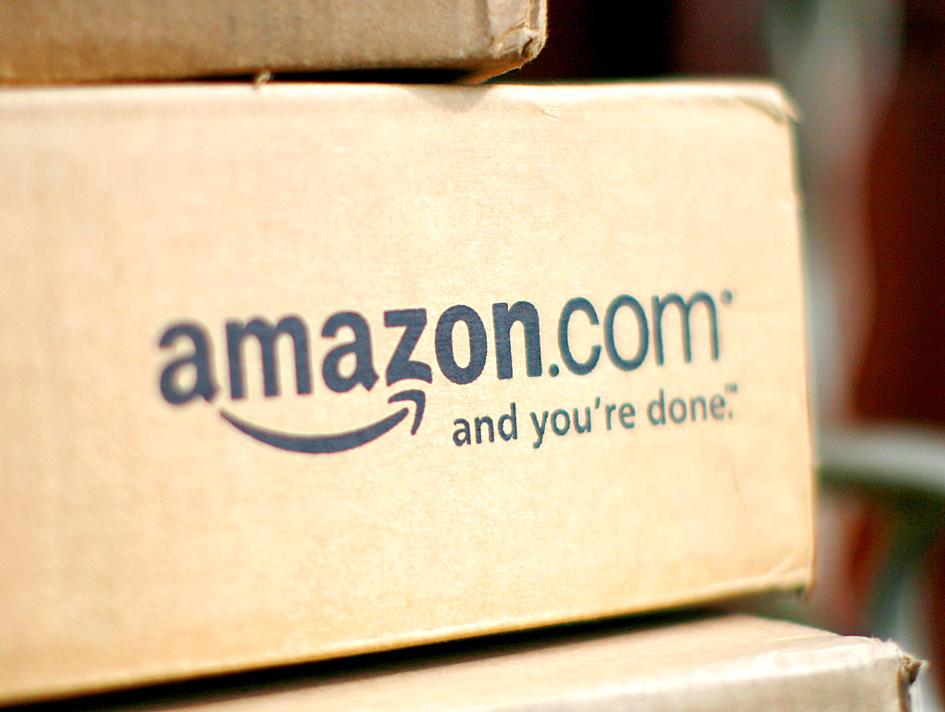Amazon.com Inc, which has been under pressure from shoppers, brands and US lawmakers to crack down on counterfeits on its site, yesterday said that it last year blocked more than 10 billion suspected phony listings before any of their offerings could be sold.
The numbers were released in Amazon’s first report on its anti-counterfeiting efforts since it announced new tools and technologies in 2019. The number of blocked phony listings last year was up about 67 percent from the year before.
The Seattle-based e-commerce behemoth said the number of counterfeiters attempting to sell on the site rose as scammers tried to take advantage of shoppers who were buying more online during the COVID-19 pandemic.

Photo: Reuters
Amazon has been wrestling with counterfeits for years.
However, since 2019, it has warned investors in government filings that the sale of phony goods poses a risk to the company and its image.
Brands might not want to sell their items on the site if they know there are fake versions being offered and knock-offs could cause shoppers to lose their trust in Amazon.
Counterfeiters try to get their products on Amazon through its third-party marketplace, where sellers can list their items directly on the site.
The company destroyed 2 million counterfeit products sent to its warehouses last year before they could be sold.
It said fewer than 0.01 percent of all items bought on the site received counterfeit complaints from shoppers.
Amazon said it can stop counterfeiters before they can sell anything thanks to machine-learning technology, which automatically scans listings to remove suspected counterfeits.
The company also gives brands a way to remove fake items from the site themselves, rather than reporting them to Amazon and waiting for it to do something.
The company’s efforts come as lawmakers are looking at ways to reduce counterfeits online.
US senators Bill Cassidy and Dick Durbin, both Democrats, reintroduced a bill this year known as the INFORM Consumers Act. It would require third-party sellers to be verified and to disclose their name and address to shoppers. The bill was introduced last year, but was not voted on.
Amazon and smaller online stores, such as eBay Inc and Etsy Inc, oppose the bill for reasons including concerns that it could discourage people from starting a small business and selling online.
However, groups that represent big-box physical retailers, such as Home Depot Inc and Lowe’s Companies Inc, support it because they say it levels the playing field, as physical retailers already make sure their shelves are free of fakes.
Amazon said it last year spent more than US$700 million on its anti-counterfeiting efforts and has 10,000 people working on it.

RUN IT BACK: A succesful first project working with hyperscalers to design chips encouraged MediaTek to start a second project, aiming to hit stride in 2028 MediaTek Inc (聯發科), the world’s biggest smartphone chip supplier, yesterday said it is engaging a second hyperscaler to help design artificial intelligence (AI) accelerators used in data centers following a similar project expected to generate revenue streams soon. The first AI accelerator project is to bring in US$1 billion revenue next year and several billion US dollars more in 2027, MediaTek chief executive officer Rick Tsai (蔡力行) told a virtual investor conference yesterday. The second AI accelerator project is expected to contribute to revenue beginning in 2028, Tsai said. MediaTek yesterday raised its revenue forecast for the global AI accelerator used

Taiwan Semiconductor Manufacturing Co (TSMC, 台積電) has secured three construction permits for its plan to build a state-of-the-art A14 wafer fab in Taichung, and is likely to start construction soon, the Central Taiwan Science Park Bureau said yesterday. Speaking with CNA, Wang Chun-chieh (王俊傑), deputy director general of the science park bureau, said the world’s largest contract chipmaker has received three construction permits — one to build a fab to roll out sophisticated chips, another to build a central utility plant to provide water and electricity for the facility and the other to build three office buildings. With the three permits, TSMC

TEMPORARY TRUCE: China has made concessions to ease rare earth trade controls, among others, while Washington holds fire on a 100% tariff on all Chinese goods China is effectively suspending implementation of additional export controls on rare earth metals and terminating investigations targeting US companies in the semiconductor supply chain, the White House announced. The White House on Saturday issued a fact sheet outlining some details of the trade pact agreed to earlier in the week by US President Donald Trump and Chinese President Xi Jinping (習近平) that aimed to ease tensions between the world’s two largest economies. Under the deal, China is to issue general licenses valid for exports of rare earths, gallium, germanium, antimony and graphite “for the benefit of US end users and their suppliers

Dutch chipmaker Nexperia BV’s China unit yesterday said that it had established sufficient inventories of finished goods and works-in-progress, and that its supply chain remained secure and stable after its parent halted wafer supplies. The Dutch company suspended supplies of wafers to its Chinese assembly plant a week ago, calling it “a direct consequence of the local management’s recent failure to comply with the agreed contractual payment terms,” Reuters reported on Friday last week. Its China unit called Nexperia’s suspension “unilateral” and “extremely irresponsible,” adding that the Dutch parent’s claim about contractual payment was “misleading and highly deceptive,” according to a statement